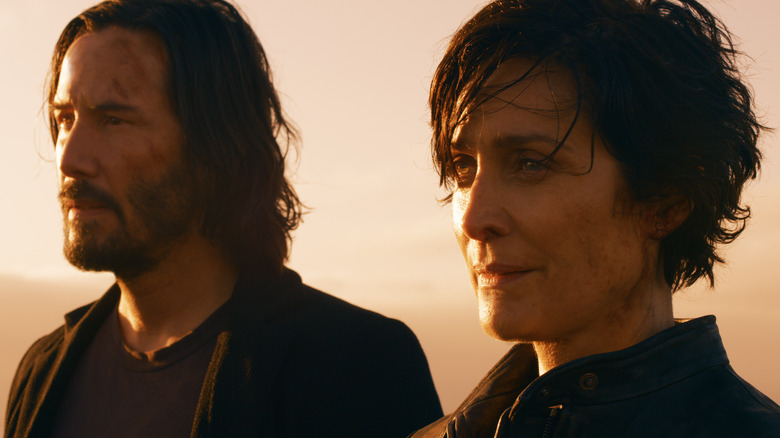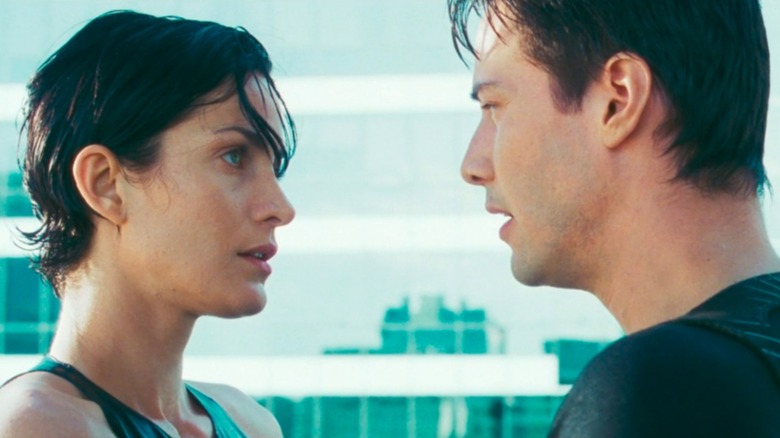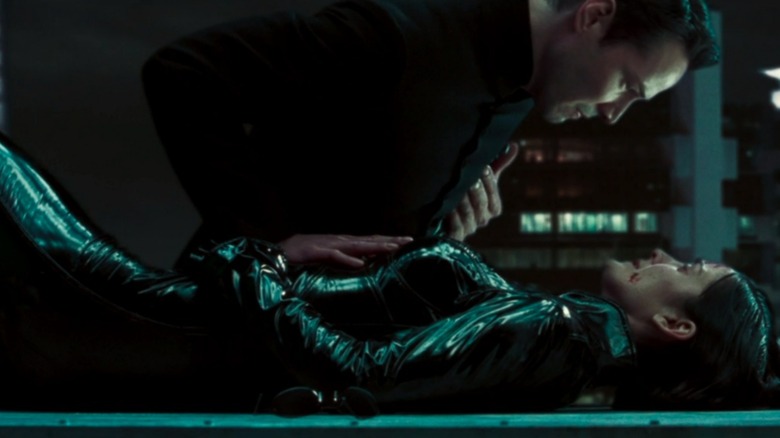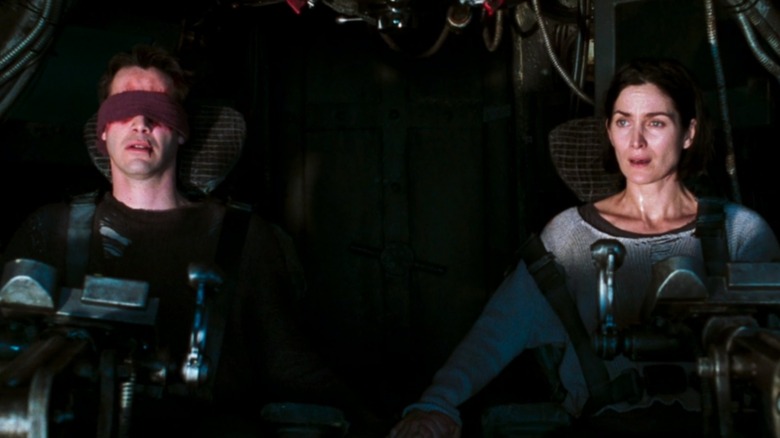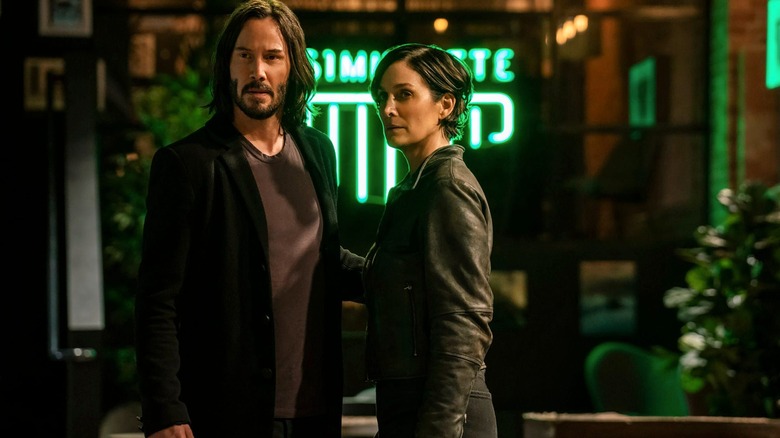The Matrix Series Has Always Been A Love Story
Ask several different people the first thing that comes to mind when they think of the "Matrix" franchise, and you're bound to get several different answers. To many, the biggest takeaway will likely be the gleefully '90s trappings of it all, filled with black leather, dorky-looking cell phones (which, between you and me, are actually cool as hell), and cutting-edge "wire-fu" fight sequences that thrill and satisfy action junkies to their heart's content. Others look deeper to embrace the philosophy of it all, with writer/directors Lana and Lilly Wachowski infusing the proceedings with genuinely thoughtful ruminations on the nature of our existence and downright spiritual missives on how best to navigate each of our chosen paths. And of course, more and more viewers have also found comfort and meaning through the unmistakable trans allegory at the heart of the trilogy, which puts certain bad-faith readings of the text in their place and ripe for reclaiming all these years later.
Arguably, the mark of a great sci-fi film is one that lends itself to all sorts of well-supported interpretations, filtered through the intensely personal perspectives of any given viewer. The mark of a legitimate classic, then, might be one that continues to reveal new layers and insights, standing the test of time no matter how much scrutiny we can throw at it. It's in that spirit that we finally acknowledge the truth right in front of us — a reality that we've always known on some level but, for whatever reason, struggled to accept.
Throughout the course of the films, the instant connection developed between Neo (Keanu Reeves) and Trinity (Carrie-Anne Moss) has served as the beating heart grounding us amid all the high-concept, bullet-dodging, realism-defying zaniness. As "The Matrix Resurrections" gears up to reshape the franchise once again with its release on HBO Max and in theaters today, let's take a look back at how each of the prior three movies steadily built up the central relationship to turn it into one of the best romances that sci-fi has to offer ... especially since it's increasingly clear that the franchise is set to reestablish itself as the love story that it's always been.
"Being the One is Just Like Being in Love"
Not for one single moment do the Wachowskis hide their intentions in "The Matrix."
Though the early stages of the film are built around a game-changing reveal — that Neo, along with most of humanity, has unwittingly languished under control of the Machines for hundreds of years — observant viewers are never led astray or distracted from what actually matters. Even before the Trinity-centric opening scene kicks things off in bullet-time style, we're all but told what deserves our attention in the story.
"You like him, don't you? You like watching him."
We first hear the disembodied voice of Cypher (Joe Pantoliano) goading Trinity, using her emotional vulnerability as a petty and cruel cudgel that ends with his brutally frank assessment of, "We're going to kill him, you understand that?" Her reply that Resistance leader Morpheus (Laurence Fishburne) "...believes he is the One" draws a direct through-line between her attraction to the mysterious "him" (the currently Matrix-bound Neo) and his destiny as the "Chosen One." This through-line later comes into focus when we find out what the mysterious Oracle (Gloria Foster) has previously told Trinity: that she'd fall in love with the One. Yet all told, scarcely a minute into the film, the Wachowskis have already established the beginnings of a romance that will change the world.
After Neo wakes up and gains freedom from the Matrix, his own visit with the Oracle heralds yet another intentional comparison between his seemingly predestined fate and the idea of love. Just when Neo (and viewers) expect her to drop ponderous words of destiny on his shoulders, the Oracle treats us to this surprising bit of wisdom instead:
"Being the One is just like being in love. No one can tell you you're in love. You just know it, through and through. Balls to bones."
The parallel is as blunt as it gets. If anyone somehow managed to ignore the romantic aspects of "The Matrix" thus far, this pivotal scene makes it all but impossible to do so anymore. It's no coincidence that Cypher's betrayal comes with the underlying bitterness of a spurned lover for Trinity's affections, just as it's no coincidence that Neo's death at Agent Smith's (Hugo Weaving) hands is only reversed by Trinity's kiss of life. "The Matrix" is a love story, through and through, and makes no bones about it.
Love and Choice
If "The Matrix" can boil down to a straightforward love story, then "The Matrix Reloaded" is as convoluted as it gets ... or is it? Upon release, audiences generally interpreted its frustrating obliqueness as a bug instead of a feature, but time has been kind to it. Consider how its most maligned aspects — that lengthy rave sequence and its third-act twist — are united in service of one idea: choosing love above all else.
The infamous rave sequence intercuts the entire city holding the wildest, most paradoxical "city on the brink of extinction" celebration that you'll ever see with images of Neo and Trinity making love. Reactions at the time questioned subjecting unsuspecting audiences to that patience-testing sequence, rather than opting for more conventional scenes featuring, well, anything else. Why even include this seemingly unnecessary and distracting plot detour at all?
The answer goes back to something that Mouse (Matt Doran), the designer of the famous "Woman in the Red Dress" program in the original movie, once said: "To deny our own impulses is to deny the very thing that makes us human." Though delivered with tongue in cheek during that particular context, this sentiment takes on greater meaning in "Reloaded" upon realizing how this last gasp of dancing, sweaty, and downright horny remnant of humanity juxtaposes itself with the oncoming arrival of the cold, calculating Machine army of Sentinels. At the center of it all, as always, are Neo and Trinity clinging to one another ... even as Neo's foreboding dreams of Trinity's demise keep threatening to pull them apart.
And then there's that pesky plot twist — the Architect scene. Although essential in flipping the entire "Matrix" franchise on its head and revealing that the very concept of the One was only another layer of the Machines' control, detractors once again missed the forest for the trees. Amid all the admittedly dense dialogue, two main recurring themes snap it all into place: love and choice. Neo, whose premonitions have come true, must choose between saving Trinity or accepting the Architect's rigged system to save a tiny group of survivors. Unlike every one of his five predecessors, Neo passes this latest red/blue pill test by returning to the Matrix and bringing Trinity back to life, consequences be damned.
He does so the only way he knows how: by literally holding onto her heart. Subtle, eh?
The Limits of Love?
In "The Matrix" and "The Matrix Reloaded," the Wachowski sisters depict love as an unstoppable force with the power to defy death itself. In "The Matrix Revolutions," however, that isn't quite enough anymore. Zion, the last human stronghold, is on the brink of annihilation. Neo embarks on a one-way quest to the Machine city and is permanently blinded by the real-world incarnation of his nemesis, Agent Smith. Trinity dies in the attempt to get them there, seemingly for good this time. For the first time in this trilogy, we seem to run into the limits of love.
But that would ignore a deceptively key scene early on in "Revolutions." In the opening minutes, Neo wakes up confused and completely out of sorts. One minute, he's singlehandedly warding off a Sentinel attack in a shocking real-world demonstration of his powers as the One at the end of "Reloaded." The next, he finds himself bearing his telltale Matrix-set appearance (despite never physically plugging in) in an abandoned train station that might as well be purgatory. Well, not completely abandoned, as he is soon beset with questions by a curious child, Sati (Tanveer K. Atwal), who turns out to be an exiled program of the Matrix. Her kindly "father," South Asian refugee Rama-Kandra (Bernard White), helps Neo gain his bearings and goes on to explain his deep, abiding love for his "family" to Neo. He draws a startling comparison between man and machine — both of whom are clearly capable of giving and receiving love ... which unsettles Neo profoundly.
Here, we receive our first hint that perhaps it's not really love itself that is limited, but our understanding of it.
After all, it's not a lack of love that motivates Trinity to rescue Neo from a bleak existence in limbo — quite the opposite, actually. Yes, she meets her ultimate demise when that same love compels her to join Neo's hopeless journey, but her sacrifice isn't in vain. Neo's own self-sacrifice to purge Agent Smith from the Matrix and reach a ceasefire with the Machines is merely an extension of his love for Trinity, expressed on a species-wide scale for all humanity. Love saves the day in "The Matrix Revolutions" ... even if the final scene encourages us to consider the Machine perspective for a change, providing a potential thread that may be unraveled in "The Matrix Resurrections."
Putting Love Back in the Limelight
Given the boundary-pushing brilliance of "The Matrix" and the ambitious, subversive, and expectation-defying tendencies of the sequels, viewers should expect that their assumptions for "The Matrix Resurrections" will not only be overturned in dramatic fashion, but that Lana Wachowski will deliver the kind of sequel that none of us ever thought we needed in the first place ... all while remaining faithful to the themes of the original trilogy. That, more than anything else, helps make it easier to accept that the fourth film will be a worthy entry to the "Matrix" canon. But don't just take that from me. Early reactions for the long-awaited sequel, /Film's review by Chris Evangelista, and even the cast themselves all emphatically back up assertions that Neo and Trinity's love story will remain in the foreground of the franchise.
In all honesty, this has felt clear right from the very first trailer, when Yahya Abdul-Mateen II's new version of Morpheus challenges Neo, "The only thing that matters to you is still here. I know that's why you're still fighting and why you will never give up." Even beyond the strong implication that he's referring to Trinity, the earlier visual of seeing Neo run into Trinity at an innocent-looking coffeeshop and hold onto her hand for just a beat too long gives the romantics among us more than enough to chew on. The stakes already feel clear — Neo doesn't just need to wake up to the reality of the Matrix once again, but he must remember his previous life with Trinity as well.
This emphasis on love is further bolstered in the second trailer, when Neo intones that, "She believed in me. It's my turn to believe in her." In fact, the entire second half of that footage is dedicated to showing Neo and Trinity back in action again, interspersed with heartfelt dialogue that wouldn't feel out of place in a standard romance/drama ("Part of me feels like I have been waiting my whole life for you," Trinity says at one point). Thrillingly, the entire climax of the trailer doesn't peak with some obligatory explosion or action beat, but with an emotional Neo and Trinity on a rooftop, desperate for connection: "I saw this in a dream," Trinity whispers. "My dream ended here."
The Wachowskis' entire filmography reflects this theme. I suspect "The Matrix Resurrections" will, as well.
